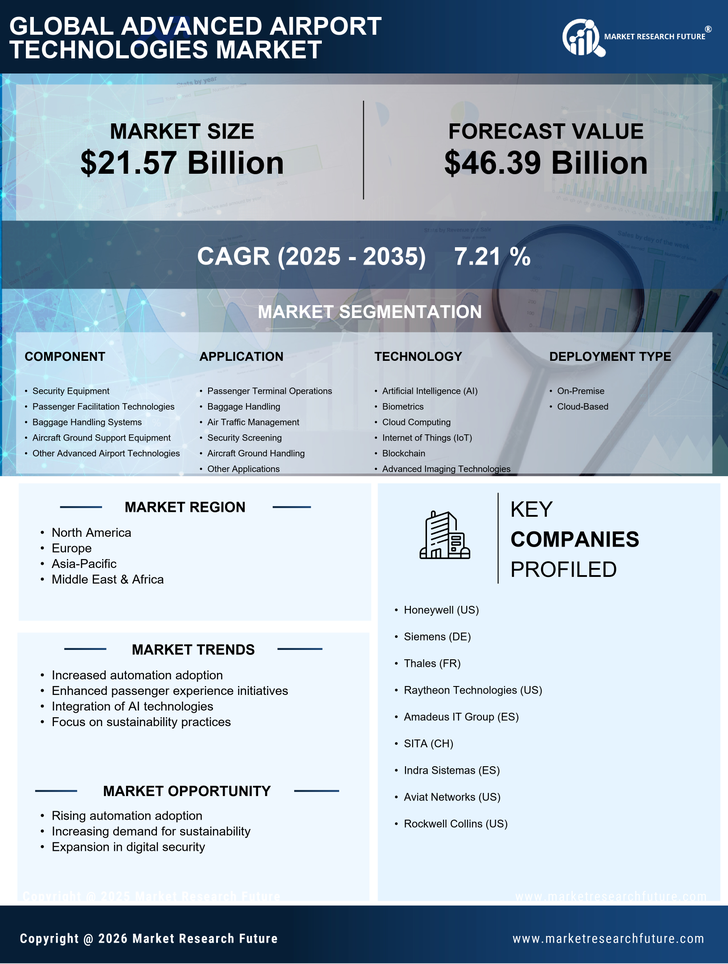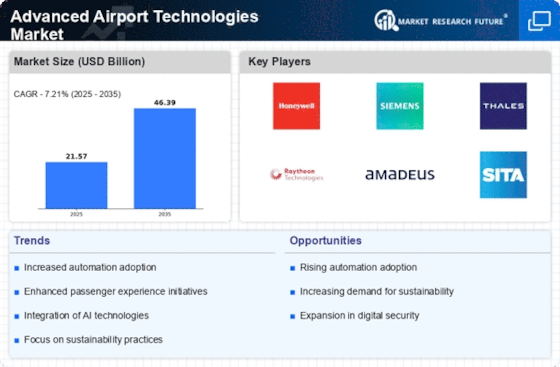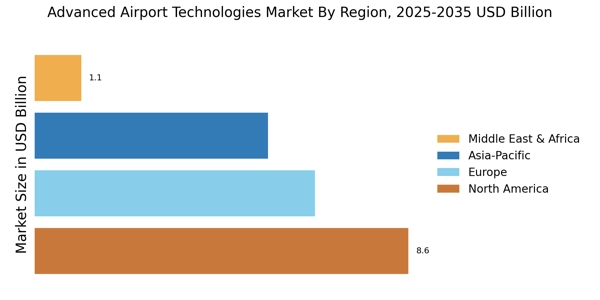Focus on Sustainability
Sustainability is becoming increasingly vital within the advanced airport technologies Market. Airports are under pressure to reduce their environmental impact and adopt eco-friendly practices. This has led to the implementation of green technologies, such as energy-efficient lighting, solar power systems, and sustainable waste management solutions. The market for sustainable airport technologies is expected to grow, with investments in green infrastructure projected to reach USD 10 billion by 2025. This focus on sustainability not only aligns with global environmental goals but also enhances the reputation of airports, attracting environmentally conscious travelers. As such, sustainability initiatives are emerging as a significant driver in the Advanced Airport Technologies Market.
Enhanced Security Measures
Security remains a paramount concern within the Advanced Airport Technologies Market. With the increasing complexity of threats, airports are prioritizing the implementation of advanced security technologies. Innovations such as AI-driven surveillance systems, automated threat detection, and biometric identification are becoming standard. These technologies not only bolster security but also expedite the screening process, thereby improving the overall passenger experience. The market for airport security technologies is expected to grow significantly, with estimates suggesting a compound annual growth rate of 7.5% over the next five years. This growth reflects the industry's commitment to ensuring safety while maintaining operational efficiency, making advanced security measures a critical driver in the Advanced Airport Technologies Market.
Increased Passenger Demand
The Advanced Airport Technologies Market is experiencing a surge in passenger demand, driven by rising global travel. As more individuals opt for air travel, airports are compelled to enhance their operational capabilities. This demand necessitates the adoption of advanced technologies to streamline processes, improve passenger experience, and manage increased traffic efficiently. According to recent data, passenger numbers are projected to reach 8.2 billion by 2037, indicating a pressing need for innovative solutions. Airports are investing in technologies such as biometric screening and automated check-in systems to accommodate this growth. The integration of these technologies not only enhances efficiency but also ensures that airports can handle the anticipated influx of travelers, thereby solidifying their position in the Advanced Airport Technologies Market.
Integration of Smart Technologies
The integration of smart technologies is transforming the Advanced Airport Technologies Market. Airports are increasingly adopting Internet of Things (IoT) solutions to enhance operational efficiency and passenger experience. Smart technologies facilitate real-time data collection and analysis, enabling airports to optimize resource allocation and improve service delivery. For instance, smart baggage tracking systems reduce lost luggage incidents, while intelligent queue management systems enhance passenger flow. The market for IoT in airports is projected to reach USD 4.5 billion by 2026, underscoring the growing reliance on technology to address operational challenges. This trend towards smart technology integration is likely to continue, positioning it as a key driver in the Advanced Airport Technologies Market.
Government Initiatives and Funding
Government initiatives and funding play a crucial role in shaping the Advanced Airport Technologies Market. Various governments are recognizing the importance of modernizing airport infrastructure and are allocating substantial budgets for technological advancements. These initiatives often include grants and subsidies aimed at encouraging airports to adopt innovative solutions. For instance, funding for the development of smart airports and advanced security systems is becoming more prevalent. This financial support is likely to accelerate the adoption of cutting-edge technologies, thereby enhancing operational efficiency and passenger satisfaction. As governments continue to prioritize airport modernization, the influx of funding is expected to drive growth in the Advanced Airport Technologies Market.


















